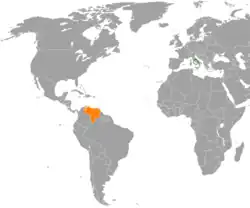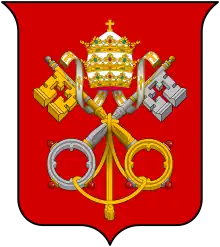 | |
Holy See |
Venezuela |
|---|---|
Holy See–Venezuela relations are foreign relations between the Holy See and Venezuela. Both countries established diplomatic relations in 1869. The Holy See has a nunciature in Caracas. Venezuela has an embassy in Rome.
Relations under the Chávez and Maduro presidencies
There have been tensions with the Vatican under the presidency of Hugo Chávez, a president who while being Catholic is ideologically influenced by Karl Marx and Vladimir Lenin, political thinkers that have historically been opposed to the influence of the Roman Catholic Church. Chávez has also been known to cite proponents of liberation theology such as Leonardo Boff,[1] whose ideas Rome had opposed in the 1980s and 1990s.
In 2009, pro-government colectivos tear-gassed the Holy See's envoy after Chávez accused the Roman Catholic Church of interfering with his government.[2][3]
Relations between the Vatican and Nicolás Maduro, Chávez's successor, have also remained tense, with the Venezuelan leader sharply critiquing, among others, a letter sent by the Vatican to foreign businesses.[4] While Cardinal Baltazar Enrique Porras Cardozo did raise the possibility in June 2021 that the Holy See mediate between the two sides in the Venezuelan political crisis,[4] such mediation has not yet taken place, as of late 2023.
See also
References
- ↑ ""Der Kapitalismus ist der Weg ins Verderben"". amerika21 (in German). 2009-12-18. Archived from the original on 2023-03-07. Retrieved 2023-11-11.
- ↑ Wallis, Dan (13 February 2014). "Venezuela violence puts focus on militant 'colectivo' groups". Retrieved 20 March 2014.
- ↑ "Wikileaks de Venezuela: chavistas Lina Ron y Valentín Santana, "terroristas" para Washington". Semana. 4 July 2011. Retrieved 1 March 2015.
- 1 2 "Venezuela's Maduro calls Vatican letter a 'compendium of hatred'". Reuters. 2021-07-22. Archived from the original on 2023-04-12. Retrieved 2023-11-11.

